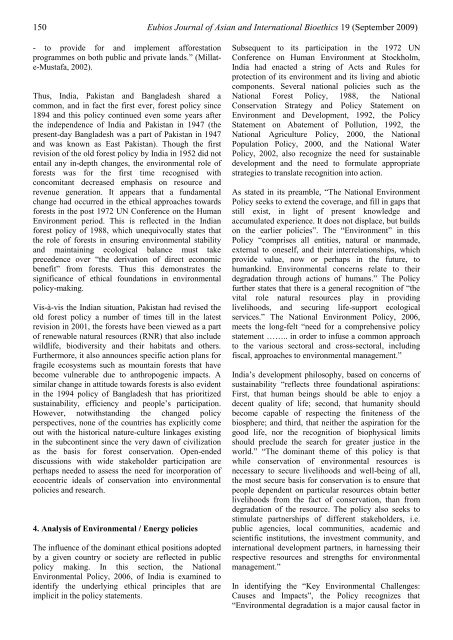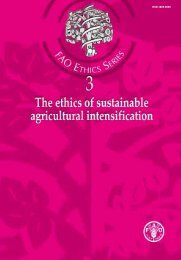Eubios Journal of Asian and International Bioethics EJAIB
Eubios Journal of Asian and International Bioethics EJAIB
Eubios Journal of Asian and International Bioethics EJAIB
You also want an ePaper? Increase the reach of your titles
YUMPU automatically turns print PDFs into web optimized ePapers that Google loves.
150 <strong>Eubios</strong> <strong>Journal</strong> <strong>of</strong> <strong>Asian</strong> <strong>and</strong> <strong>International</strong> <strong>Bioethics</strong> 19 (September 2009)<br />
- to provide for <strong>and</strong> implement afforestation<br />
programmes on both public <strong>and</strong> private l<strong>and</strong>s.” (Millate-Mustafa,<br />
2002).<br />
Thus, India, Pakistan <strong>and</strong> Bangladesh shared a<br />
common, <strong>and</strong> in fact the first ever, forest policy since<br />
1894 <strong>and</strong> this policy continued even some years after<br />
the independence <strong>of</strong> India <strong>and</strong> Pakistan in 1947 (the<br />
present-day Bangladesh was a part <strong>of</strong> Pakistan in 1947<br />
<strong>and</strong> was known as East Pakistan). Though the first<br />
revision <strong>of</strong> the old forest policy by India in 1952 did not<br />
entail any in-depth changes, the environmental role <strong>of</strong><br />
forests was for the first time recognised with<br />
concomitant decreased emphasis on resource <strong>and</strong><br />
revenue generation. It appears that a fundamental<br />
change had occurred in the ethical approaches towards<br />
forests in the post 1972 UN Conference on the Human<br />
Environment period. This is reflected in the Indian<br />
forest policy <strong>of</strong> 1988, which unequivocally states that<br />
the role <strong>of</strong> forests in ensuring environmental stability<br />
<strong>and</strong> maintaining ecological balance must take<br />
precedence over “the derivation <strong>of</strong> direct economic<br />
benefit” from forests. Thus this demonstrates the<br />
significance <strong>of</strong> ethical foundations in environmental<br />
policy-making.<br />
Vis-à-vis the Indian situation, Pakistan had revised the<br />
old forest policy a number <strong>of</strong> times till in the latest<br />
revision in 2001, the forests have been viewed as a part<br />
<strong>of</strong> renewable natural resources (RNR) that also include<br />
wildlife, biodiversity <strong>and</strong> their habitats <strong>and</strong> others.<br />
Furthermore, it also announces specific action plans for<br />
fragile ecosystems such as mountain forests that have<br />
become vulnerable due to anthropogenic impacts. A<br />
similar change in attitude towards forests is also evident<br />
in the 1994 policy <strong>of</strong> Bangladesh that has prioritized<br />
sustainability, efficiency <strong>and</strong> people‟s participation.<br />
However, notwithst<strong>and</strong>ing the changed policy<br />
perspectives, none <strong>of</strong> the countries has explicitly come<br />
out with the historical nature-culture linkages existing<br />
in the subcontinent since the very dawn <strong>of</strong> civilization<br />
as the basis for forest conservation. Open-ended<br />
discussions with wide stakeholder participation are<br />
perhaps needed to assess the need for incorporation <strong>of</strong><br />
ecocentric ideals <strong>of</strong> conservation into environmental<br />
policies <strong>and</strong> research.<br />
4. Analysis <strong>of</strong> Environmental / Energy policies<br />
The influence <strong>of</strong> the dominant ethical positions adopted<br />
by a given country or society are reflected in public<br />
policy making. In this section, the National<br />
Environmental Policy, 2006, <strong>of</strong> India is examined to<br />
identify the underlying ethical principles that are<br />
implicit in the policy statements.<br />
Subsequent to its participation in the 1972 UN<br />
Conference on Human Environment at Stockholm,<br />
India had enacted a string <strong>of</strong> Acts <strong>and</strong> Rules for<br />
protection <strong>of</strong> its environment <strong>and</strong> its living <strong>and</strong> abiotic<br />
components. Several national policies such as the<br />
National Forest Policy, 1988, the National<br />
Conservation Strategy <strong>and</strong> Policy Statement on<br />
Environment <strong>and</strong> Development, 1992, the Policy<br />
Statement on Abatement <strong>of</strong> Pollution, 1992, the<br />
National Agriculture Policy, 2000, the National<br />
Population Policy, 2000, <strong>and</strong> the National Water<br />
Policy, 2002, also recognize the need for sustainable<br />
development <strong>and</strong> the need to formulate appropriate<br />
strategies to translate recognition into action.<br />
As stated in its preamble, “The National Environment<br />
Policy seeks to extend the coverage, <strong>and</strong> fill in gaps that<br />
still exist, in light <strong>of</strong> present knowledge <strong>and</strong><br />
accumulated experience. It does not displace, but builds<br />
on the earlier policies”. The “Environment” in this<br />
Policy “comprises all entities, natural or manmade,<br />
external to oneself, <strong>and</strong> their interrelationships, which<br />
provide value, now or perhaps in the future, to<br />
humankind. Environmental concerns relate to their<br />
degradation through actions <strong>of</strong> humans.” The Policy<br />
further states that there is a general recognition <strong>of</strong> “the<br />
vital role natural resources play in providing<br />
livelihoods, <strong>and</strong> securing life-support ecological<br />
services.” The National Environment Policy, 2006,<br />
meets the long-felt “need for a comprehensive policy<br />
statement …….. in order to infuse a common approach<br />
to the various sectoral <strong>and</strong> cross-sectoral, including<br />
fiscal, approaches to environmental management.”<br />
India‟s development philosophy, based on concerns <strong>of</strong><br />
sustainability “reflects three foundational aspirations:<br />
First, that human beings should be able to enjoy a<br />
decent quality <strong>of</strong> life; second, that humanity should<br />
become capable <strong>of</strong> respecting the finiteness <strong>of</strong> the<br />
biosphere; <strong>and</strong> third, that neither the aspiration for the<br />
good life, nor the recognition <strong>of</strong> biophysical limits<br />
should preclude the search for greater justice in the<br />
world.” “The dominant theme <strong>of</strong> this policy is that<br />
while conservation <strong>of</strong> environmental resources is<br />
necessary to secure livelihoods <strong>and</strong> well-being <strong>of</strong> all,<br />
the most secure basis for conservation is to ensure that<br />
people dependent on particular resources obtain better<br />
livelihoods from the fact <strong>of</strong> conservation, than from<br />
degradation <strong>of</strong> the resource. The policy also seeks to<br />
stimulate partnerships <strong>of</strong> different stakeholders, i.e.<br />
public agencies, local communities, academic <strong>and</strong><br />
scientific institutions, the investment community, <strong>and</strong><br />
international development partners, in harnessing their<br />
respective resources <strong>and</strong> strengths for environmental<br />
management.”<br />
In identifying the “Key Environmental Challenges:<br />
Causes <strong>and</strong> Impacts”, the Policy recognizes that<br />
“Environmental degradation is a major causal factor in

















